Turkey’s military actions should not have surprised anyone, argues Amanda Sloat. Despite his fiery rhetoric, Erdoğan has largely gritted his teeth as American-backed YPG forces cleared the Islamic State from significant swaths of Syria. This piece originally appeared on Foreign Policy.
Long-simmering tensions between Turkey and Kurdish fighters in Syria came to a head over the weekend.
On Jan. 20, Turkey launched what it calls Operation Olive Branch, a military campaign against the People’s Protection Units (YPG) in Afrin, in northwestern Syria. The operation is part of Ankara’s long-standing effort to prevent the YPG, which has benefited from American backing in its fight against the Islamic State since the fall of 2014, from developing an autonomous region in Syria along the entirety of the countries’ shared border. Turkish objections stem from the YPG’s links to the Kurdistan Workers’ Party (PKK), which is designated a terrorist organization by the United States and European Union and has waged an ongoing battle against Turkey that has resulted in tens of thousands of people dead.
According to Turkey’s Office of Public Diplomacy, the objectives of the intervention include ensuring Turkey’s border security, countering U.S. support for a terrorist organization, blocking the YPG from reaching the eastern Mediterranean and cutting off Turkey’s geographical contact with the Arab world, and ensuring that the Turkish-supported Syrian opposition controls a 3,861-square-mile area.
Bungled messaging by the Trump administration prompted Turkey’s recent move, although it is also the result of broader questions that have emerged throughout the conflict. Since the beginning of the uprising, the U.S. government has struggled to develop a coherent Syria policy. The Barack Obama administration, which wanted to prevent American entanglement in another Middle Eastern war, focused its military efforts on countering the Islamic State, given the threat it posed to the homeland and regional allies. When U.S. special forces sought ground forces with whom to partner, they found YPG fighters to be effective. More importantly, they were willing to fight the Islamic State, whereas other opposition groups prioritized the defeat of the Assad regime. Negotiations with Turkey about joint action against the Islamic State were largely unsuccessful. The previous administration papered over the geopolitical implications of its YPG partnership in pursuit of its counterterrorism objective. The Trump administration has largely adopted this same approach. Although State Department officials claim the U.S. relationship with the YPG is “temporary, transactional, and tactical,” it has never been clear if the Defense Department shares this view. The Pentagon has played an outsized role in managing counter-Islamic State policy, particularly in the current administration with a leadership dominated by generals.
Lack of consistent messaging and policy coordination across the Trump administration has complicated this already delicate matter. When President Donald Trump took office, Turkish President Recep Tayyip Erdoğan hoped that the United States would reverse its support for the YPG. Trump not only maintained the policy but also implemented an Obama-era plan to arm the YPG for the assault on the Islamic State in Raqqa, about which the United State informed Erdoğan days before his visit to Washington in May 2017. With that battle over, Trump told his counterpart in a November 2017 phone call that the United States would stop supplying weapons to the YPG. This move caught the Defense Department off guard, which quickly clarified it was “reviewing pending adjustments.” This month, the Pentagon surprised the White House when the allied military headquarters leading the campaign against the Islamic State announced plans for a 30,000-strong border security force with a significant YPG component that would be deployed along the Turkish border. When the Turks reacted with predictable anger, the State Department scrambled to control the damage. As Secretary of State Rex Tillerson explained: “That entire situation has been misportrayed, misdescribed. Some people misspoke. We are not creating a border security force at all.”
Despite his fiery rhetoric, Erdoğan has largely gritted his teeth as American-backed YPG forces cleared the Islamic State from significant swaths of Syria.
Within this context, Turkey’s military actions should not have surprised anyone. Despite his fiery rhetoric, Erdoğan has largely gritted his teeth as American-backed YPG forces cleared the Islamic State from significant swaths of Syria. However, he has consistently proved his readiness to take military action in defense of a clear red line: any moves by the YPG to connect three cantons in northern Syria along the Turkish border into a unified Kurdish region. There is concern such territory could be used as a staging ground for attacks on southern Turkey, as well as encourage similar moves toward autonomy by Turkey’s Kurdish population. In August 2016, Turkey launched Operation Euphrates Shield, a seven-month mission to clear the remaining Islamic State forces from its border and block movement by the YPG. Last October, Erdoğan sent forces into Syria as part of a joint mission with Russia and Iran, ostensibly aimed at the Islamic State but with implications for the YPG. At that time, Erdoğan warned against Kurdish aggression toward Turkish troops: “We have no tolerance for the smallest wrong in Afrin.”
In addition to security concerns, Erdoğan’s actions should be seen in the context of Turkish domestic politics. The misstep by the Trump administration compelled Erdoğan to address a perceived threat by presenting himself as a strong leader capable of defending Turkish security. With parliamentary and presidential elections that will determine his political future on the horizon, many of his foreign-policy considerations are driven by the need to bolster his nationalist base. Moreover, maintaining rhetorical and political pressure on the Syrian Kurds serves to delegitimize the voice of Turkish Kurds. Erdoğan initiated a peace process with the PKK that achieved some success, although a two-and-a-half-year cease-fire broke down in July 2015. This coincided with electoral politics, as the pro-Kurdish Peoples’ Democratic Party (HDP) denied the ruling party a majority in June 2015 elections and surpassed for the first time the 10 percent threshold required to enter parliament. The government dragged its feet on coalition formation and reran elections that fall. Since November 2016, the party’s co-leaders and 10 HDP members of parliament have been jailed on spurious terrorism charges. Resolution of the YPG problem requires resolution of the PKK problem.
Thus far, the international community has been measured in its response to Turkish actions. On Sunday, the State Department expressed support for the “legitimate security concerns of Turkey as a NATO Ally and critical partner in the effort to defeat ISIS.” It called on Turkey to “exercise restraint and ensure that its military operations remain limited in scope and duration and scrupulous to avoid civilian casualties.” Defense Secretary James Mattis, who acknowledged that Ankara had provided advance notice of its operation, said, “It’s easy to understand why Turkey has concerns about the chaos.” British Foreign Secretary Boris Johnson tweeted, “Turkey is right to want to keep its borders secure.” Similarly, a NATO spokesman said Turkey has the right to self-defense but urged action in a “proportionate and measured way.” The French were stronger in their calls for restraint and requested U.N. Security Council discussions, which were held in a closed-door session on Monday. Trump and Erdoğan will reportedly speak on Wednesday.
The Russian reaction has been telling. Given its control of airspace around Afrin, Russia clearly acquiesced to the Turkish operation. (Erdoğan dispatched his military and intelligence chiefs to Moscow last week to discuss plans.) Russia also removed troops from harm’s way, including military advisors working with YPG forces there. Erdoğan has been notably silent about Russia’s partnership with the YPG given Turkey’s lack of leverage and vulnerability to Russia’s Kurdish policy. Moscow is seeking political capital from recent events, which it described as the result of “provocative U.S. steps aimed at the separation of regions with predominantly Kurdish populations.” On Monday, Russian Foreign Minister Sergei Lavrov criticized American cooperation with the YPG as either a “misunderstanding of the whole situation or a deliberate provocation.”
In the near term, another fix will be found: most likely some accommodation of Turkey’s desire to create a face-saving, Kurd-free buffer zone along its border. The international community has signaled its acceptance of limited Turkish military action, emphasizing restraint and avoidance of civilian casualties. Yet as the operation continued into its fourth day, Mattis expressed concern that it could distract from efforts to conclude the international fight against the Islamic State. More broadly, dealing with these combustible issues cannot be put off indefinitely. In addition to questions about the extent of Turkey’s military action, the Kurdish issue will continue festering in peace talks amid disagreements over YPG participation, as well as governance and security arrangements for a post-Islamic State Syria. Lavrov announced Monday that Russia had invited Kurdish representatives (seemingly over long-standing Turkish objections and notwithstanding ongoing military operations) to join the next round of peace talks in Sochi, Russia, later this month, stating they should play a role in the “future political process.” Some Syrian Kurds have decried these talks as meaningless after “Russian collusion” with Turkey in Afrin.
Syria poses a wicked policy conundrum, complicated by numerous external actors who have competing interests and webs of relationships. To date, the U.S. approach has been militarily driven and narrowly focused on the Islamic State. It needs to become much more holistic with a broader awareness of regional dynamics. Last week, Tillerson outlined a reasonable way forward that called for a continued U.S. presence in Syria to prevent a resurgence of terrorist violence, ensure a change of regime leadership, and help reconstruct liberated areas so refugees can return home. The challenge, as he acknowledged, will be managing the agendas of external actors with their own stakes in Syria’s future. Among the many obstacles to implementing this policy is Turkish opposition to what Ankara interprets as American security guarantees for a YPG-controlled region. The United States does not appear to have fully grappled with the complexity of this issue, as evidenced by disparate messaging from across the government. The lack of active U.S. involvement in the peace process—which is managed by Russia, Turkey, and Iran—further limits its room for maneuver.
The United States chose to support the YPG in the fight against the Islamic State, partly driven by a desire to avoid becoming enmeshed in the conflict. Yet this decision may ironically dictate greater American involvement on the ground to prevent a new war among its proxies. Wishing away Turkish concerns is not a strategy. The conflict between Turkey and the Kurds is a key part of the larger Syrian puzzle.
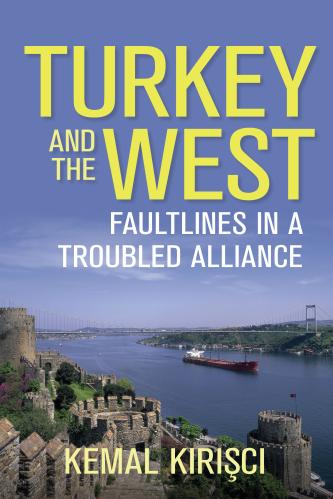
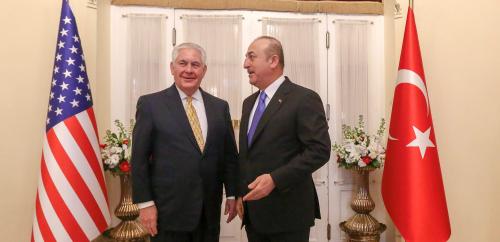
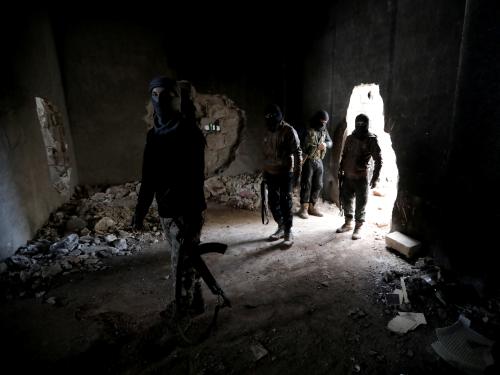
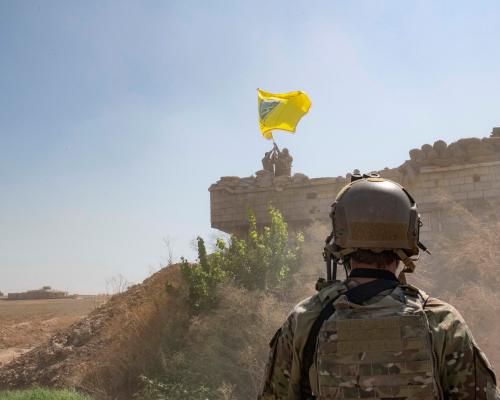


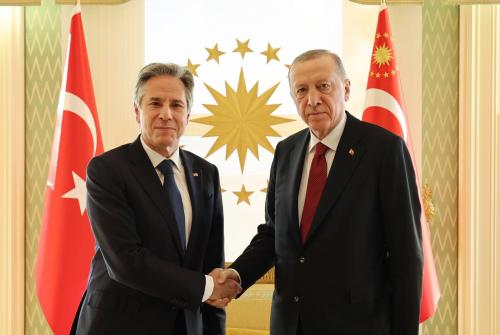
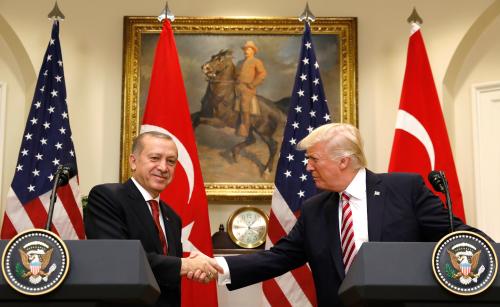
Commentary
Turkey wants to crush US allies in Syria. That shouldn’t surprise anybody.
January 24, 2018